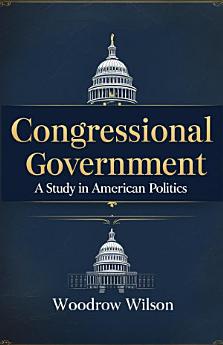Congressional government A study in American politics
Jul 2025 · BEYOND BOOKS HUB
Ebook
195
Pages
reportRatings and reviews aren’t verified Learn More
About this ebook
Congressional Government: A Study in American Politics is Woodrow Wilson’s groundbreaking 1885 examination of the structure and function of the U.S. federal government, written while he was still a young academic. This seminal work analyzes the operation of the American political system, particularly the relationship between the legislative and executive branches, at a time when many Americans were questioning the efficacy of their institutions. In this classic treatise, Wilson critiques the U.S. system of government for its diffusion of responsibility, particularly highlighting the power of congressional committees and the comparative weakness of the executive branch. Drawing contrasts with the British parliamentary system, Wilson suggests that the American separation of powers has led to legislative dominance and executive inefficiency. Chapters focus on the inner workings of the House of Representatives, particularly its control over revenue and appropriation, the functions and influence of the Senate, and the constrained role of the President. His thesis—that Congress holds disproportionate control over policy—would later influence his views as President, where he sought to strengthen executive leadership. Still widely read in political science and history courses, Congressional Government offers not only a lucid account of 19th-century American politics but also enduring insights into the complexities of democratic governance and institutional accountability.
About the author
Woodrow Wilson (1856–1924) was the 28th President of the United States and a noted political scientist and academic. Before his presidency, he served as President of Princeton University and Governor of New Jersey. A scholar of political institutions, Wilson authored several influential works, including Congressional Government, which helped shape his views on executive power and reform. His presidency is best remembered for leadership during World War I and his vision for the League of Nations.
Rate this ebook
Tell us what you think.
Reading information
Smartphones and tablets
Install the Google Play Books app for Android and iPad/iPhone. It syncs automatically with your account and allows you to read online or offline wherever you are.
Laptops and computers
You can listen to audiobooks purchased on Google Play using your computer's web browser.
eReaders and other devices
To read on e-ink devices like Kobo eReaders, you'll need to download a file and transfer it to your device. Follow the detailed Help Center instructions to transfer the files to supported eReaders.







